- Home
- Lou Cameron
Stringer on Pikes Peak
Stringer on Pikes Peak Read online
STRINGER ON PIKE’S PEAK
STRINGER SERIES #13
LOU CAMERON
STRINGER ON PIKE’S PEAK
Copyright © 1989 by Lou Cameron.
First ebook edition copyright 2012 AudioGO. All Rights Reserved.
Trade ISBN 978-1-62064-163-7
Library ISBN 978-0-7927-9081-5
Cover photo © iStockPhoto/dmathies
STRINGER On PIKE’s peak
CONTENTS
CHAPTER ONE
CHAPTER TWO
CHAPTER THREE
CHAPTER FOUR
CHAPTER FIVE
CHAPTER SIX
CHAPTER SEVEN
CHAPTER EIGHT
CHAPTER NINE
CHAPTER TEN
CHAPTER ELEVEN
CHAPTER TWELVE
CHAPTER THIRTEEN
CHAPTER FOURTEEN
CHAPTER FIFTEEN
CHAPTER SIXTEEN
CHAPTER SEVENTEEN
MORE EBOOKS BY LOU CAMERON
CHAPTER ONE
The troops bound for Cripple Creek had to change from broad to narrow-gauge rolling stock at Colorado Springs. Hence the scene in the busy Denver & Rio Grande switchyards might have been confusing enough if the sun hadn’t been going down, a thunderstorm hadn’t been brewing up, and a corporal’s squad of the Colorado National Guard hadn’t been marching Stringer MacKail across the tangle of tracks at bayonet point.
As they approached the last toylike car of the narrow-gauge combination Stringer had been heading for to begin with, a rear door slid open and a portly part-time officer in khaki pants and an army blue summer shirt popped out onto the observation platform to observe whatever in thunder his corporal of the guard had stumbled over this time.
It appeared at first glance to be a tall tanned cowhand wearing a battered gray Stetson crushed Rough Rider style and separated from his scuffed spurred Justins by a clean and well-fitting but mighty sun-faded outfit of denim jacket and matching jeans.
One of the guardsmen had naturally relieved the mysterious civilian of his sidearm as well as other baggage. But their senior officer could see the gun rig strapped about the prisoner’s lean hips rode neither greenhorn high nor gunslinger-on-the-prod low. So he simply growled, “I give up. Are you another gunhand hired by the rough and ready M.O.A. or another union thug sent for by the wild and woolly W.F.M.? In neither case will you be drifting one mile closer to the fun and games up around Cripple Creek, if you know what’s good for you!”
The target of his possibly well-meant warning laughed incredulously and replied, “No offense, ah, Major, but this is commencing to get sort of silly. To begin with I’ve come in peace to cover the big miner’s strike for the San Francisco Sun. I ride for them as a freelance feature writer and I answer to Stringer MacKail, even if they do have me down as Stuart K. MacKail on my press credentials.”
Then he added, “I’d be proud to show you my credentials, if you’d tell these chocolate soldiers not to jab at me with those nickel-plated pig stickers on their infernal Krags.”
The paunchy field grade officer stared down even more disgusted to grumble, “Jesus H. Christ, they warned us you and other sob sisters might be coming to put more bad things about us in the outside newspapers. I’ve read your socialist trash in the papers, MacKail. So I’ll take your word you’re who you say you are. I can’t see any self-respecting gunfighter trying to pass his fool self off as a red flag newspaper boy!”
Stringer frowned hard as he tried to digest that crap about red flags. He couldn’t. So he tried, “I think you must have me and my paper mixed up with others, Major. The owners of the Sun are hard-shell capitalists and my feature editor, Sam Barca, is inclined to view your average reservation jump as a Marxist plot.”
The portly part-time warrior replied in a tone of unimpressed dismissal, “Be that as it may, we have our orders. Neither Governor Peabody nor General Bell want any press coverage during the present, ah, emergency.”
Up the line, the small Shay engine tooted its tin whistle and commenced to ring its cowbell. So the major told his men to hand back Stringer’s baggage and sidearm. As Stringer took them with a curt nod of thanks the older man added, not unkindly, “General Bell and his G.H.Q. staff will be staying at the Broadmoor Hotel, here in town. I’m sure our public relations office will be handing out the usual press releases from time to time.”
Stringer knew that was a raindrop he’d just felt hitting his hat brim. It still felt as if he was getting spit on. He shook his head and insisted, “You can’t do this, Major. The freedom of the press is guaranteed under the Constitution of these United States and, last time I looked, Colorado was one of the same, right?”
The major shrugged again and answered, with a grim little smile, “Feel free to write your congressman, your own congressman, California boy. Nobody here said you weren’t free as any other bird to flap your sweet way over to the gold fields in the foothills. It just so happens, however, that as of now this railroad, the wagon trace, and every goddamned bridge or tunnel leading in or out of Cripple Creek has been or soon will be sealed off by military personnel, with orders to shoot to kill until further notice!”
Stringer had made his way clear of the switchyards but he was still on railroad property when a mighty whiplash of blinding white lightning disemboweled the dark overcast above. So it was coming down fire and salt by the time he’d made it to the dubious shelter of a deserted baggage platform.
He figured he was already as wet as he needed to be and hunkered down to haul a canary yellow rain slicker from his battered but thoughtfully packed gladstone. Made in Connecticut for the New England fishing trade, the brand was as popular among hands who faced weather as wet on open range or open sea.
Packing his gladstone in his left hand, Stringer sloshed on over towards Nevada Street through the blinding gully washer. He’d waded perhaps twenty yards before he noticed his right hand seemed to be roosting wetly on the hard rubber grips of his double-action S&W .38 by way of the innocent-looking pocket slit on that side of his old slicker. He’d cut away the original cloth pocket a spell back, after barely living through another rainy night with his infernal side arm hung up under all that stiff yellow oilcloth.
But he saw nothing in the swirling darkness all around him to justify such instinctive caution on his own part. He hadn’t taken that shoot-to-kill bullshit from a puffed-up, part-time, man-of-destiny too seriously. The pompous fart had talked too big for a man packing a serious punch and, what the hell, nobody had said anything about Downtown Colorado Springs being off limits to the Fourth Estate.
Since they’d refused him a ride on their shitty troop train he knew he was stuck here in more civilized parts for at least the night. Then he suddenly saw why he’d been feeling spooked, and it didn’t make him feel one iota better. For anyone could see the evening was young and that he had to be somewhere near the center of town. So why was it black as a bitch betwixt lightning flashes and why were all the windows staring at him as dark as the eye sockets of skulls when the sky above did flicker some?
The silvery veils of slashing rain explained why anyone with a lick of sense and a place to be was indoors off the streets right now. But even most cow towns had been wired for electric street lighting by the turn of the century, and Colorado Springs was a cut or more above your average cow town.
It was the county seat as well as being a college town that took some pride in being more up to date than the older Denver to the north or brawling Pueblo to the south and, last time Stringer had looked, both downtown Denver and Pueblo’s main street had blazed pretty good this early in the evening, rain or shine.
He was still pondering on why all the lights were out when he spied the
cheerful glow of lamplight shining out a batwinged doorway on the far side of the flooded cross street he’d come to. As he stepped off the high sandstone curb into quite an ankle-deep current, he decided Fountain Creek, the normally inches deep trickle running through town had to be well above its usual banks. That inspired Stringer to recall the legendary Cherry Creek Flood they still talked about up in Denver. But as he made it to the far side without being swept out across the prairie to his doom he discovered he was only soaked from the knees down. He knew he’d never get his Justins back on if he let them dry out without his feet inside ’em, so he ignored the way his socks squished inside the soaked leather as he pushed his way through the bat wings to wet his innards with something less disgusting than tepid rainwater off his hatbrim.
It wasn’t easy, the welcoming warm glow in a dank sea of darkness had attracted quite a crowd and there were even soggy working girls of the more ladylike persuasion jostling for standing room in the tiny drinking establishment. As Stringer tried to slide the wet back of his slicker along the plate glass saloon front to one end of the bar a half-drowned Gibson Girl told him not to get fresh and went right on blocking his way. He sighed and eased back the other way, about ready to give it all back to the earlier birds, when he heard a familiar voice calling out to him from somewhere in the depths of the jam-packed joint and, knowing he could do it if he really put his back into it, Stringer began to bull his way back to join his fellow Californian and sometimes-friendly rival, Jack London.
The erstwhile oyster pirate and waterfront thug of Frisco Bay had commenced to dress more like a river-boat gambler since he’d sold his big dog story, “Call Of The Wild” to a public Stringer suspected of knowing even less about the recent events in Alaska. But he still needed a good dentist and, even with his mouth shut, always reminded Stringer of a superannuated Irish choirboy with an unwholesome interest in the poor box. As Stringer got within reach, London grabbed him by one arm and muttered, “Back room, if we can get there. I know the boyos here of old. So for God’s sake let me do the talking for the both of us and leave off your Adam Smith views on the economy of this great wicked world!”
Stringer didn’t argue. Arguing with Jack London on almost any subject was a waste of time. For, like many self-educated men with a greater gift of gab than serious study, the former Marxist and more recent Social Darwinist could argue both sides and often did. Stringer knew that back in ’93 a younger Jack London had marched on Washington in the van of Coxey’s Red Army and been arrested for walking on the grass in front of the White House. Of course, that had been before old Jack had taken to glorifying the rugged individualists of the Northwest in his blood and thunder novels, and often just as made-up newspaper articles. Stringer could hardly wait to see how old Jack meant to cover the current unrest up near Cripple Creek. For both the crusty Mine Owners Association, and the radical Big Bill Heywood leading the Western Federation Of Miners seemed cut from the whole cloth of a Jack London adventure novel, with either as fit to play the hero or villain, depending on old Jack’s current stock portfolio.
It was at times like these that Stringer felt beset about having grown up neither mind-twisting poor nor smug-snob rich. He took pride in reporting things the way they really were and he already knew there were at least three sides to the showdown building to a climax over in the gold fields. There was the Mine Owners’ Side, the Mine Workers’ Side, and, as always, the truth.
Stringer began to suspect he knew which side Jack London would come out for when they found themselves in a back room a third as large but a hell of a lot less crowded than the Black Hole of Calcutta they’d just escaped. His friendly rival was greeted like an old chum by more than one gent seated around the beer schooners and poker chips on a massive round table, and most of them were dressed more like mining men than Stringer was. As Stringer peeled off his wet yellow slicker London announced in a jovial tone, “This cuss ain’t really the Sundance Kid, boys. He just led a misspent youth on a cow spread east of Frisco when I was learning to steal oysters. I want you all to meet the one and original Stringer MacKail from the San Francisco Sun.”
As Stringer hung his slicker on a wall hook, among others of less bright coloration, the big burly cuss dealing the cards at the moment growled, “No more names, first or last, if you don’t mind, Jack. If you say he’s with you, he’s welcome back here as an orphan of the storm and no more. For I have read the San Francisco Sun and to tell the truth I wouldn’t wipe my ass on a rag that would back our darling Teddy Roosevelt for dog catcher.”
There was a growl of agreement from the other roughly dressed and somewhat soggy sorts. Jack London led Stringer around to the far side and banged imperiously on what seemed to be the door of a dumbwaiter built into the wall. But when the panel slid open Stringer saw it was just a means of communication betwixt the back room and the crowded bar out front. Jack London told the harrassed-looking barkeep they needed a pitcher of beer back here. It only took a few moments. Once they had it, London led Stringer to a smaller table in one corner, saying, “This’ll have to do. Nobody but a Paddy fresh off the boat from Kerry would want to risk a match stem in that game of stud with Big Bill dealing.”
Stringer tried not to stare in an obvious manner as he helped himself to a better look at the object of London’s dubious flattery. The fact that Big Bill Hey wood was a ruggedly handsome giant of around thirty-five was less surprising than the fact he was down here in Colorado Springs at a time the Colorado Guard was fixing to do something serious about him up in Cripple Creek. Stringer wondered if the union organizer knew they were blocking off all the ways in and out, with orders to shoot to kill. He wondered how he was supposed to mention this to a man who’d just said he didn’t want to be addressed by his proper name. He wondered what business it was of his own in any case.
Stringer had eaten a late lunch that afternoon while waiting for the Colorado National Guard to show up, for all the good it had done him, but he still hadn’t had any supper. So after a polite sip of the beer London poured for both of them, he leaned back and got out the makings, murmuring, “I’d best take it easy on the suds until I figure out where I’ll be having a late supper and laying my weary head, tonight, Jack. I don’t suppose you’d know a decent hotel within wading distance of this meager shelter?”
London reached expansively inside his frock coat to haul out a hotel key on a polished wooden tab, saying, “You can use up my hired single with bath at the Alta Vista, pard. For I’m just waiting out a midnight special to Cheyenne and, what the hell, I may as well stay here warm and dry as well as closer to the depot.”
Stringer was no fool, so he pocketed the key fast, but felt it only fair to ask, “What do I owe you for such hospitality, Jack? I can always charge room and board in the field to my paper and …”
“Not the Alta Vista,” London cut in, cheerfully. Then, as Stringer looked blank, the more prosperous writer explained, “It’s about as ritsy titsy as the Broadmoor over on the far side of the raging flood or, hell, the Brown Palace in Denver or the Saint Francis back home. I paid in advance, figuring on being here over the damned weekend. They don’t give refunds, the capitalistic bastards, so why should some fancy dude get to sleep in a fancy layout I’ve been stuck with?”
Stringer didn’t answer as he finished rolling his Bull Durham cigarette. He was a mite annoyed by London’s gesture, now that he saw how the joke was supposed to work. But he wasn’t annoyed enough to turn down a free hotel room in a crowded town. So he sealed the straw paper carefully with the tip of his tongue and lit the results before he asked, quietly, “Aren’t you here to cover the troubles over in Cripple Creek, Jack?”
London shook his head and replied, “There’s just not much of a market for appeals to social justice, these days, Stringer. Karl Marx has been dead over twenty years and I fear we’ve about mined him out. That young Lime-juice writer, H.G. Wells, has been getting off a lot of neat digs at the bloated capitalists with his futuristic novels. You’ve
read his stuff, of course?”
Stringer nodded and said, “I didn’t know The War of the Worlds was a socialist tract. Which one of his stories are you planning on swiping, Jack?”
London smiled as brazenly as any man with such rotten stumps could smile and answered, “I told you that exclusive you filed on Soapy Smith that time was Public Domain, damn it. Did you really think a true story everyone in Alaska knew about was your own damned private property?”
Before Stringer could answer the back room was suddenly as brightly lit as broad daylight and almost everyone but Stringer cheered. He just stared up slack-jawed at the overhead Edison bulbs he’d never noticed up there in the smoke filled gloom before. Like most folk of his generation, he’d grown up mostly by gas or coal oil light and tended not to think about electricity as long as things were working halfway reasonable, the way they always had.
Jack London said, “That’s what I was doing here in Colorado Springs. That’s what I thought I was doing, I mean. I was passing through Cheyenne a few days ago when I heard they were having trouble with the electric juice down here, again.”
The lights winked off again, plunging them all back into the now much gloomier glow of the one overhead oil lamp. “I’d say they still were,” Stringer observed dryly, adding, “What did you mean by again?”
London shot him a look of sincere surprise and asked, “Are you saying you never covered that story? It was the wonder of the West and I thought Sam Barca liked to assign such shit to you, pard.”
Stringer asked which wonder of the West they were talking about, and when it might have taken place in or near Colorado Springs. When London told him 1899, Stringer nodded thoughtfully and said, “Alaska. I don’t see why my paper thought a lad who’d put himself through Stanford punching cows would know beans about panning for gold in ice water, but that’s life. What did I miss down here?”

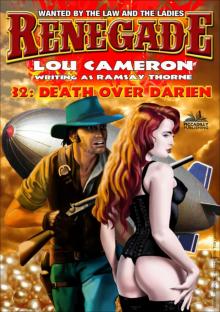 Renegade 32
Renegade 32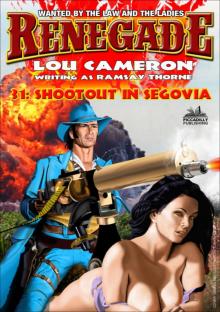 Renegade 31
Renegade 31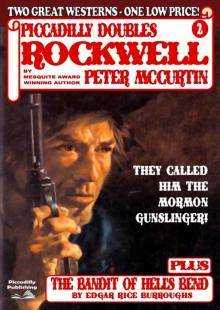 Piccadilly Doubles 2
Piccadilly Doubles 2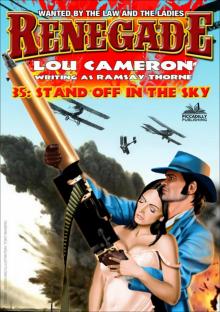 Renegade 35
Renegade 35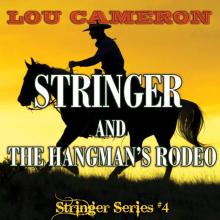 Stringer and the Hangman's Rodeo
Stringer and the Hangman's Rodeo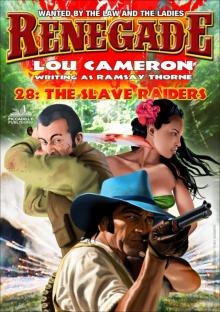 Renegade 28
Renegade 28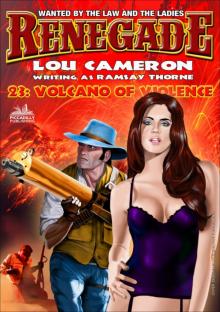 Renegade 23
Renegade 23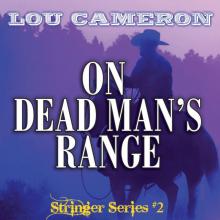 On Dead Man's Range
On Dead Man's Range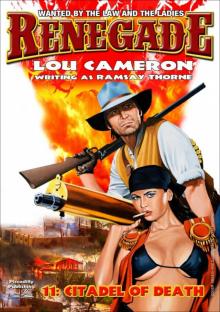 Citadel of Death (A Captain Gringo Western Book 11)
Citadel of Death (A Captain Gringo Western Book 11)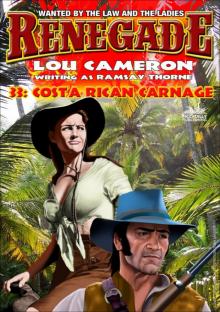 Renegade 33
Renegade 33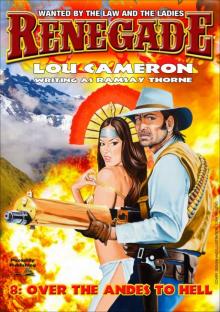 Over the Andes to Hell (A Captain Gringo Western Book 8)
Over the Andes to Hell (A Captain Gringo Western Book 8)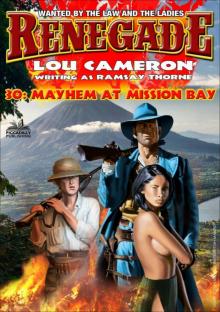 Renegade 30
Renegade 30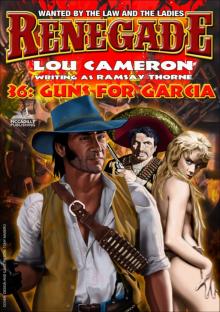 Renegade 36
Renegade 36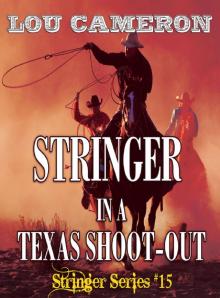 Stringer in a Texas Shoot-Out
Stringer in a Texas Shoot-Out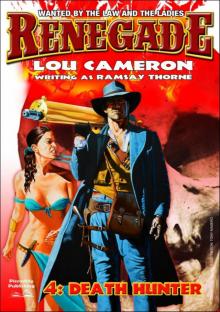 The Death Hunter
The Death Hunter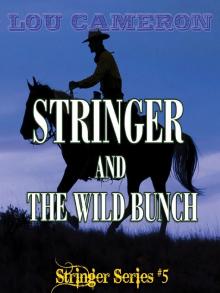 Stringer and the Wild Bunch
Stringer and the Wild Bunch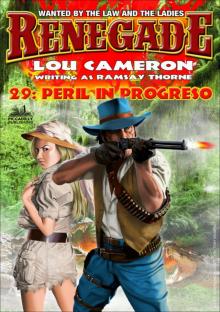 Renegade 29
Renegade 29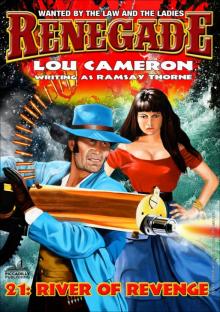 Renegade 21
Renegade 21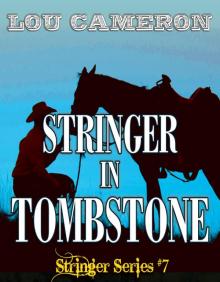 Stringer in Tombstone
Stringer in Tombstone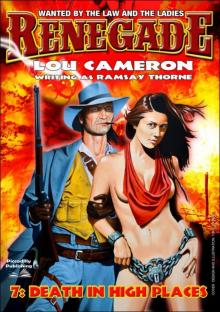 Death in High Places (A Renegade Western Book 7)
Death in High Places (A Renegade Western Book 7)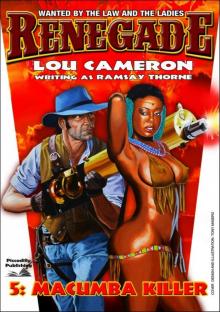 Macumba Killer
Macumba Killer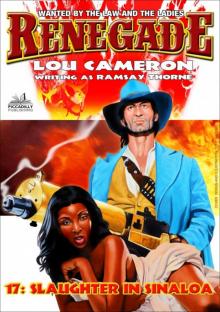 Renegade 17
Renegade 17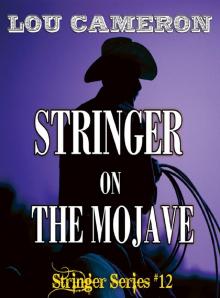 Stringer on the Mojave
Stringer on the Mojave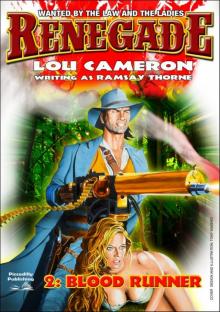 Blood Runner
Blood Runner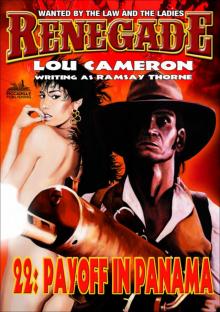 Renegade 22
Renegade 22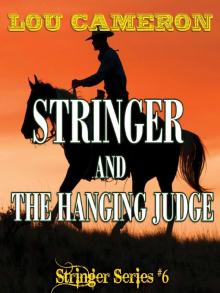 Stringer and the Hanging Judge
Stringer and the Hanging Judge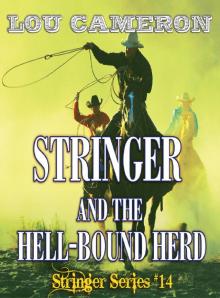 Stringer and the Hell-Bound Herd
Stringer and the Hell-Bound Herd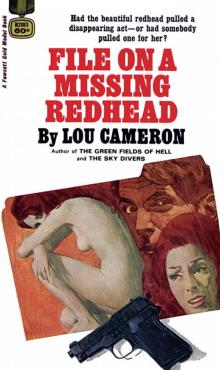 File on a Missing Redhead
File on a Missing Redhead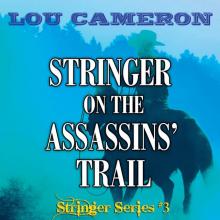 Stringer on the Assassins' Trail
Stringer on the Assassins' Trail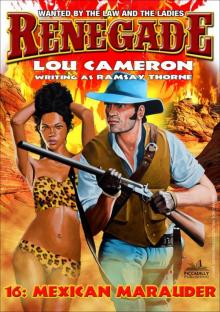 Mexican Marauder (A Captain Gringo Adventure #16)
Mexican Marauder (A Captain Gringo Adventure #16)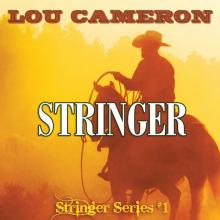 Stringer
Stringer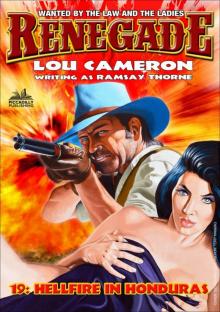 Renegade 19
Renegade 19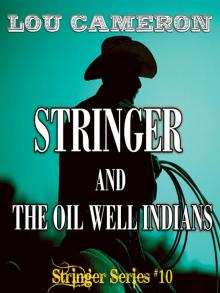 Stringer and the Oil Well Indians
Stringer and the Oil Well Indians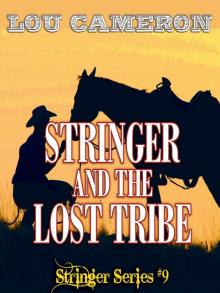 Stringer and the Lost Tribe
Stringer and the Lost Tribe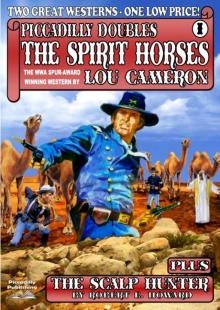 Piccadilly Doubles 1
Piccadilly Doubles 1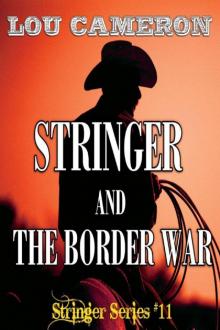 Stringer and the Border War
Stringer and the Border War Renegade
Renegade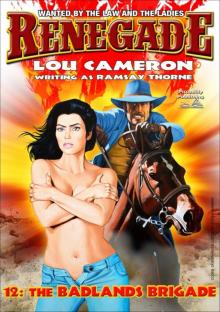 The Badlands Brigade (A Captain Gringo Adventure Book 12)
The Badlands Brigade (A Captain Gringo Adventure Book 12)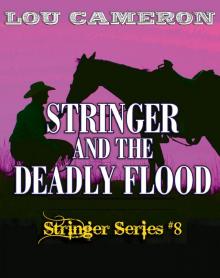 Stringer and the Deadly Flood
Stringer and the Deadly Flood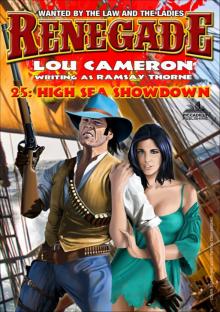 Renegade 25
Renegade 25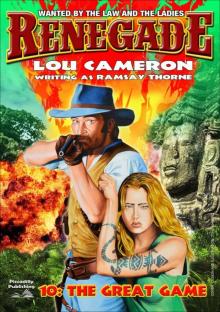 The Great Game (A Captain Gringo Western Book 10)
The Great Game (A Captain Gringo Western Book 10)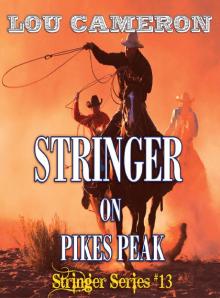 Stringer on Pikes Peak
Stringer on Pikes Peak